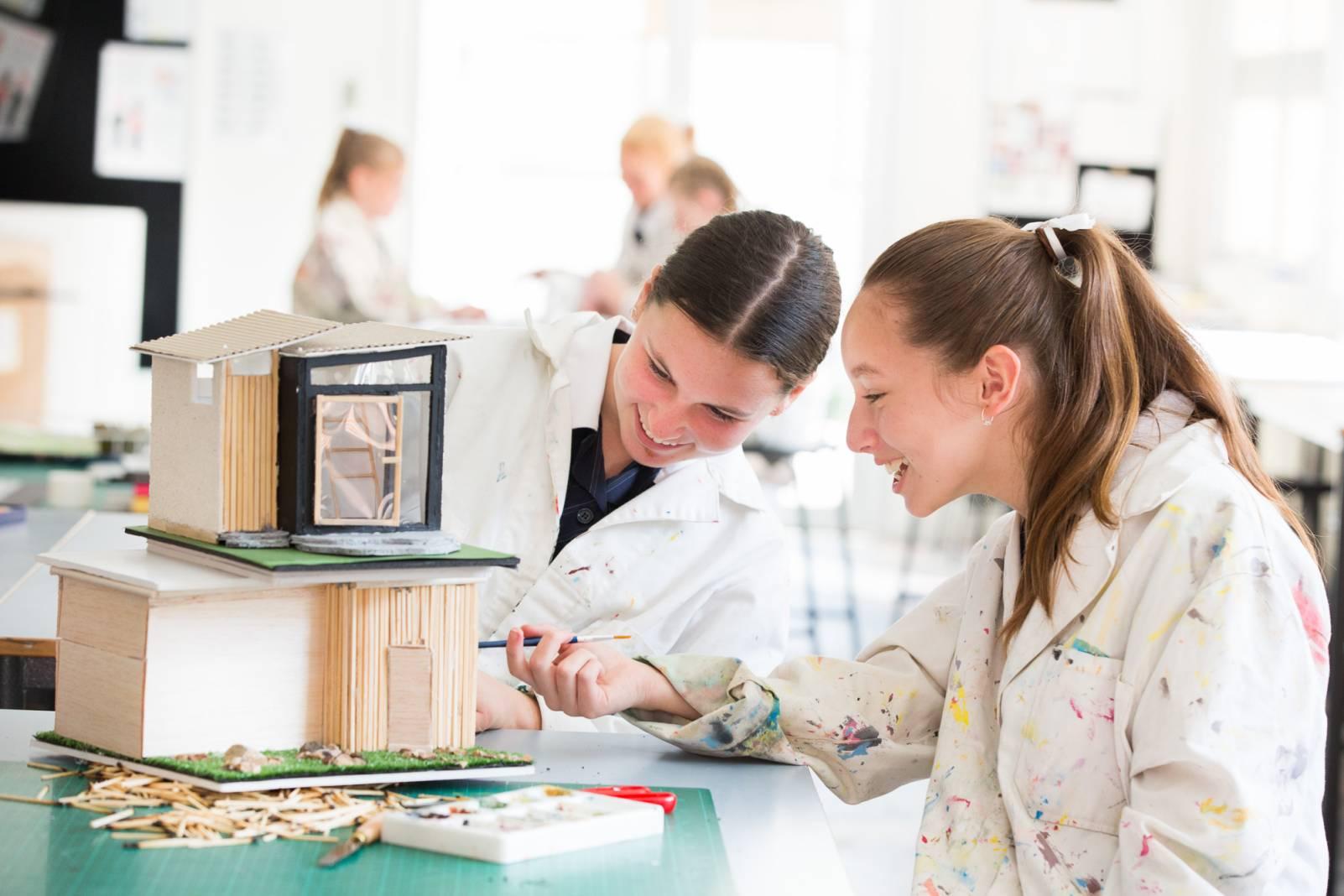Rationale
The Professional Learning and Development program at Mount St. Joseph Girls’ College will enhance the capacity of all staff to contribute to the achievement of the College goals as articulated by the four-year School Improvement Plan. As a learning community, the College has a responsibility to provide the appropriate support for staff and the school community to continually develop their knowledge, skills and career opportunities through a comprehensive professional learning program.
Coaching and Feedback
In 2021, Mount St. Joseph Girls’ College will enhance the coaching and feedback model.
The Growth model of Coaching is a method for goal setting and problem-solving that has been adopted as a Coaching methodology at MSJ with a number of staff trained as coaches. The basis of Growth Coaching is that learning conversations can take place between school leaders and staff and between teachers in peer-based conversations, where colleagues work collaboratively using a coaching approach to focus on enhancing each other’s teaching practice.
The key to the format in 2021 is working in teams as they solve the problems and answer the questions that arise as they implement the new strategies, interventions and content.
Process
An integral part of this framework includes:
It is important that students see this process as a significant strategy for continuous improvement and that the student voice is valued in this framework.
Feedback and Reflection on Learning
Teacher feedback about student learning is essential for students and integral to teaching, learning and assessment. Feedback can clarify for students:
Feedback can occur at any point in the teaching, learning and assessment cycle. It may:
Students benefit from opportunities to self-assess, self-monitor and make judgements about their work in relation to standards and regular opportunities to reflect on their learning.
When students become reflective about the teaching and learning process, they are strengthening their own capacity to learn. Central to this is the principle of reflection where students are aware of and can describe their thinking in a way that allows them to "close the gap" between what they know and what they need to learn.
Reflection on learning is effective when students are able to easily describe:
Later in the year, parents and carers will receive their student's personal NAPLAN report. The report will describe your child’s particular skills in Reading, Writing, Language Conventions (spelling, grammar and punctuation) and Numeracy. The report will also show how your child performed in relation to national minimum standards. These describe the minimum acceptable standards for students across Australia.
Formal examinations provide students with the opportunity to demonstrate the depth of understanding of work covered over an extended period of time. It also provides students with first-hand experience of formal examination procedures. The examination results, in conjunction with other assessment results, will provide students with significant feedback regarding areas of strength and areas of improvement.
The examination period for Year 11 students is Friday 11 to Friday 18 June
Students will be given an examination timetable and the dates and times of each exam must be read carefully.
All students must attend their scheduled exams in their full school uniform. There are no scheduled classes for Year 11 students during these exams, so students are expected at school only for their timetabled exams.
The examination period for Year 10 students is Tuesday 15 June to Thursday 17 June. There will not be scheduled classes for Year 10 students on Friday 18 June.
Year 10 exams will cover the core subjects of English, Religious Education, Humanities, Mathematics and Science only. All students must attend their scheduled exams in their full school uniform. There are no scheduled classes for Year 10 students during these exams, so students are expected at school only for their timetabled exams.
The examination period for Year 9 students is Thursday 17 June and Friday 18 June.
Year 9 exams will cover the core subjects of English and Science only.
The normal timetable continues where an exam is not scheduled. These arrangements will provide minimal disruption to the learning and teaching program and allows a more effective elective program.
Year 8 students will have Semester 2 exams in English and Maths and there are no exams for Year 7 students.
Students enrolled in a Unit 3/4 study will sit the GAT. The GAT will be held on Wednesday 9 June from 10.00am to 1.15pm. Students must arrive at least 30 minutes prior to its commencement.
The GAT involves two written tasks on reading comprehension and communication of ideas and information, and a multiple choice test in two sections:
In preparation for the GAT, there will be a ‘GAT CHAT’ on Monday 31 May, Period 4. All Years 11 and 12 students enrolled in a Unit 3/4 study will be given significant information about the GAT including the importance of the GAT and strategies that will assist in completing the GAT. It is expected that all VCE Year 11 and 12 students enrolled in a Unit 3/4 study attend.
While the GAT results do not automatically contribute towards the VCE, the results do play a very important part in the final assessment of the VCE as they are used to check that the Examinations, SACs and SATs have been accurately and fairly marked. Further, if a student is ill, has an accident or experiences severe personal hardship at the time of an Examination, a student may apply for a Derived Examination Score (DES). The GAT results contribute towards the calculation of the DES.
Further information on the GAT can be found at:
http://www.vcaa.vic.edu.au/vce...
Joanna De Bono - Deputy Principal Learning & Staff
Throughout the year, students complete a range of assessments in each of their classes. These assessments can be used to assess student understanding as they are learning and at the end of a unit of work. Assessments that occur throughout a unit to assess student progress are called formative assessments. Assessments that occur at the end of a unit of work are called summative assessments. Both provide valuable information for the teacher and students to work together and improve student learning outcomes.

What is Formative Assessment
The aim of formative assessment is to monitor student learning as it happens and provide feedback to both the student and the teacher that can help them decide on what needs to happen next. More specifically, formative assessment allows students to identify their strengths and areas for growth.
Formative assessment doesn’t wait until students have finished their topic or unit. Instead, this assessment takes place during learning so that both students and teachers still have an opportunity to make changes and improvements along the way.
Formative assessments are usually small, low stakes activities that students can complete without the pressure of having a result recorded. Often, formative assessment will not communicate achievement using a letter grade or percentage as this does not indicate to students what they did well, or what they need to change or improve. Rather, these tasks emphasise written, verbal or rubric feedback that can be used to make improvements. This provides students with specific actions that can be taken to make future improvements.
Why we use and value Formative Assessment
At Mount St. Joseph Girls’ College, we value the learning of each student. Providing ongoing feedback for our students is crucial to their development as learners in our classroom. Formative tasks allow students to take risks with their learning, practice skills and build towards a better understanding of concepts and content.
“Teachers who use formative assessment are able to better understand the learner and use the data for the development of individualised instruction for each specific learner”.
D. Wiliam, University College, London.
Examples of Formative Assessments
10 minute quick-write in class
Practice exam questions
Pre-test
Concept Map of prior knowledge
Group discussions
How can I support my child with Formative Assessment Feedback
Talk with your child about formative tasks that may not have a grade. Try not to restrict your conversations to marks and percentages.
Together, read the feedback provided on your child’s work.
Discuss with your child what the teacher has written or what the rubric shows about their progress.
Ask your child to explain to you what the feedback is asking them to do next and ask, ‘What is the next step?’
Katharine Anastasi, Grace Gonzalez & Kate Gready
Learning Development Team






